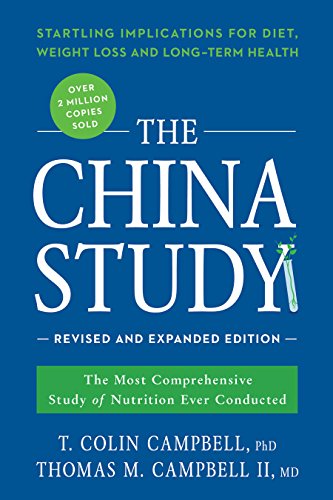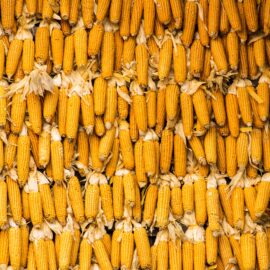

This article is an excerpt from the Shortform summary of "The China Study" by Colin Campbell. Shortform has the world's best summaries of books you should be reading.
Like this article? Sign up for a free trial here .
What is the whole foods, plant-based diet for weight loss? How do you follow this diet? Will it really help you lose weight?
The whole foods, plant-based diet for weight loss is a diet that relies on unrefined plant foods for all of its calories and nutrients.
Learn how adopting a WFPB weight loss diet can help you meet your weight-loss goals and lower your disease risk.
Why the Whole Foods, Plant-Based Diet for Weight Loss is Effective
The whole foods, plant-based diet, also known as the WFPB diet, is the key to becoming healthier and losing weight. And most Americans could benefit from it.
More than two-thirds of American adults are overweight, and one-third are obese, and this isn’t just a problem for adults. Obesity in children is on the rise as well. Of children ages 6 to 11, 18% are overweight, and of children ages 12 to 19, 21% are overweight. A further 15% are at risk of becoming overweight.
Aside from making many everyday tasks uncomfortable or painful, obesity is a problem because it’s linked to numerous health issues, including diabetes and heart disease.
How a WFPB Weight Loss Diet Can Help
Going on diets and popping weight-loss pills have become national pastimes. In 2006, we spent $147-$210 billion on obesity-related medical treatments and an additional $60 billion out-of-pocket on weight-loss programs and supplements. Yet one-third of us are still obese.
As we’ve all heard before, diet and exercise are the keys to weight loss. But we may not have tried a WFPB weight loss diet.
Diet
Studies show that a whole foods, plant-based diet for weight loss is effective in the long-term. For example, vegetarians and vegans weigh five to thirty pounds less than their meat-eating fellows. Additionally, BMI decreases the longer you’ve been a vegetarian or vegan.
Participants in intervention studies who ate low-fat, whole-food, primarily plant-based diets:
- Lost two to five pounds in 12 days.
- Lost ten pounds in three weeks.
- Lost 16 pounds in 12 weeks.
- And lost 24 pounds in a year.
3 Reasons to Adopt a Whole Foods, Plant-Based Diet for Weight Loss
Reason #1: It’s relatively simple, compared with other diet plans.
You don’t have to count calories. You don’t have to calculate the percentage of carbohydrates, fat, and protein you eat. There aren’t any points. And you can eat as much as you want, as long as the foods are whole and plant-based.
Reason #2: You won’t be hungry and therefore tempted to cheat.
Even if your aim is to lose weight, you shouldn’t starve yourself. Over time, hunger sends a signal to your body to slow your metabolism to conserve energy. This means you burn less fat.
Even when WFPB study participants ate fewer calories, they were fuller than meat-eaters because they ate a larger volume of food. Fruits, vegetables, and whole grains are full of fiber, which keeps you feeling satisfied.
Some studies show that WFPB participants eat more calories than meat-eaters. But they’re still slimmer. This is because plant-eaters have a higher resting metabolism, meaning they burn more calories as heat rather than storing them as body fat.
Reason #3: You’ll want to exercise more.
In his studies with rats, Dr. Campbell, head of the China Study, and his team found that animals fed 5% casein diets (casein is the primary protein in milk) exercised twice as much on the first day of the experiment as animals fed 20% casein diets. The first group continued to exercise more throughout the study.
3 Reasons Weight Loss Might Elude You on a WFPB Weight Loss Diet
Reason #1: You’re eating too many refined foods, including chips, candy, pastries, and pasta.
Be aware that being vegan is not the same as eating a WFPB diet. You can be a vegan and live on potato chips and Oreos. The WF in WFPB, whole foods, is just as important as the PB, plant-based. You likely won’t lose much weight if you substitute junk-food products for animal products.
Reason #2: You don’t exercise.
Any diet is most effective when paired with regular physical activity.
Reason #3: You have a genetic predisposition for being overweight.
This isn’t an excuse to eat whatever you want. Diet and exercise are still effective. But for certain people, losing weight is more challenging than for others.
Exercise
Studies show that exercising for 15-45 minutes a day, every day, will help you lose 11-18 pounds and keep those pounds off. Daily chores like grocery shopping and vacuuming count—you can burn 100-800 calories per activity.
WFPB Weight Loss: Summary of Recommendations
- To lose weight, avoid junk food and refined foods like white bread and pasta.
- Don’t spend time, money, or energy on weight-loss programs that promise quick fixes.
- Eat as much as you want, as long as what you’re eating is plant-based and unrefined.
- Exercise 15-45 minutes a day, every day.
If you stick to a whole foods, plant-based diet for weight loss, you’ll reap more and more benefits over time. In addition to weight loss, you’ll likely have more energy and lower your risk for a number of diseases.
———End of Preview———

Like what you just read? Read the rest of the world's best summary of "The China Study" at Shortform . Learn the book's critical concepts in 20 minutes or less .
Here's what you'll find in our full The China Study summary :
- Why animal proteins (meat, milk) might cause cancer, diabetes, and other diseases
- Why the medical institution is structured to hide the truth about disease and food
- The precise diet you'll need to eat to live longer and feel happier






